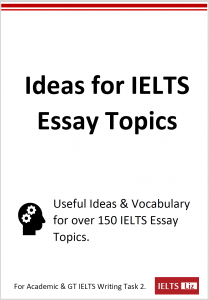Many students ask me if it’s ok to use the passive voice to give your own opinion in an IELTS essay.
For example:
Is it possible to use “it is believed …” or “it is thought …” instead of “in my opinion” or “I believe”
This lesson will
- explain when to use passive voice
- explain about using passive voice for opinions
- explain what the examiner is looking for in IELTS writing task 2 opinion essay
- provide Free Video Lessons:
- Expressing your Opinion for IELTS Writing Task 2
- Language for Discussion Essays
- give useful links for IELTS
Examples of passive and active voice:
- The road was built a long time ago = passive
- The Romans built the road a long time ago = active
Which should we use and when?
When to Use Passive Voice
We use passive voice in the following situations and ways:
- when the performer (the person doing the action) is unknown or irrelevant
- “More wind power is used than solar power.” In this sentence, the people using the power is irrelevant to the information so passive voice is used.
- “The information was hacked from the computer.” In this sentence, the person doing the hacking is possibly not known or the person is not important to the person speaking so passive voice was used.
- when it refers to a group of unspecified people
- “It is thought that the government should improve the infrastructure of all major cities.” In this sentence, we do not know who the people are that think this. We only know that it refers to “some people” but not a specified group.
- when the person doing the action is less important than the action itself
- “The decision was made by the committee.” In this sentence, “the decision” is more important than “the committee” so the decision becomes the subject and passive voice is used. The person doing the action is added after using “by ….”
- depending on what is most important to the person speaking or the thing doing the action
- “Trees produce more oxygen.” is an active sentence and “trees” is the subject. “More oxygen is produced by trees.” is passive voice. This is used because “oxygen” is more important than “trees”.
Passive Voice for Giving Opinions
From the above information, we can see that the passive voice “it is thought” does not refer to you. It refers to other people who are not specified, for example “It is thought by some people that ….” is NOT your opinion.
You use the passive voice in IELTS writing task 2 to write about other people’s opinions. For example, “It is believed by some that children should focus on sciences at school, while it is believed by others that children should spend time focusing on the arts.” Two opposite views belonging to other people – not you.
This means you could use the passive voice in a Discussion Essay or in your Background Statement when you introduce other people’s views before you give your own in the Thesis Statement.
IELTS Writing Task 2: Your Opinion
When the IELTS writing task 2 instructions ask for your opinion, you must state your opinion clearly. This means it will be an active sentence. You will need to state:
I think / I believe / In my opinion
If you use “it is believed”, this is not your opinion. It belongs to other people. The examiner give you a lower score because you didn’t give your opinion. You can’t use “it is believed” to express your own view. It is grammatically incorrect in English and it is a big mistake in IELTS writing task 2.
How to Give your Opinion: Free Video Lesson
Watch this video lessons to help tips about expressing your opinion in IELTS writing task 2.
[su_youtube url=”https://youtu.be/SpAIW4p8wkw”]Discussion Essay Language: Free Video Lesson
[su_youtube url=”https://youtu.be/gCo9L1nLlQ0″]More IELTS Tips
Click the following link to see model essays for IELTS writing task 2 and more tips: IELTS Writing Task 2 Main Page
See a Model Opinion Essay (Agree/ Disagree)
See a Model Discussion Essay
For tips and practice in other parts of the IELTS test, follow the links below:
Main IELTS Pages
Develop your IELTS skills with tips, lessons, free videos and more.
- IELTS Listening
- IELTS Reading
- IELTS Writing Task 1
- IELTS Writing Task 2
- IELTS Speaking
- Vocabulary for IELTS







